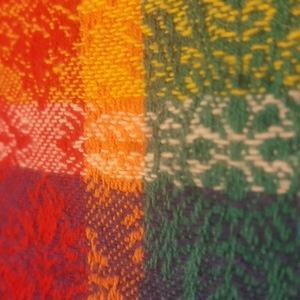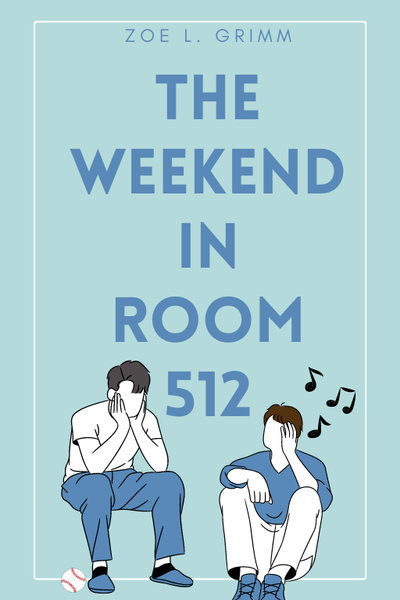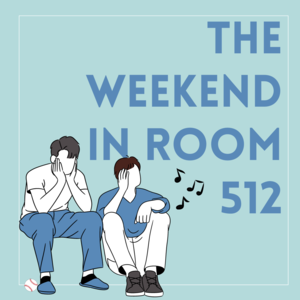Despite everything, he still had that unrelenting optimism and certainty that I'd do well in my concerto.
"I'm sure you'll do great."
I hated it. Hated that I agreed to stay with him for the weekend, that he said something like that. Despite all this time, I hated that he still obviously wanted to talk to me, didn't hate me, or seemed to loathe that I had broke up with him in the first place.
I hated that I couldn't hate him. I could never hate him. Not for offering a hotel room or for anything he could've said or done—he had done nothing wrong.
Cameron deserved to be angry, furious even, loathe my entire existence for breaking up with him and breaking my promise of staying over a phone call. And yet, he still wore that stupid smile that had made me fall for him in the first place.
On the off chance that I had read him wrong, maybe that smile had been more sinister, a spiteful one for getting me to share the hotel room under a friendly pretense before yelling and screaming at me. Who knows, maybe he had learned to throw a punch by now?
His parting words and forlorn gaze as he left killed any chance of that ever being the case. Cameron was still the same ray of sunshine that didn't have a damned negative bone in his body. A body that objectively got more attractive—granted, most teens do after high school; something about a later maturity range—not that I was lucky enough to forego. Not that I'd care to admit it, but he was more attractive in a way that I found distracting and annoying.
I was supposed to be over him, thought I was, anyway. But being in an enclosed space with nothing but my phone as a distraction made it impossible to avoid recognizing the changes.
I didn't think I could breathe normally until he left the room for his practice. My heart didn't calm down either, wracking against my chest. Traitor.
With Cameron gone, the room felt empty, unbearably silent. He took up space in every room, not in a bad way. Yes, he could be loud and annoyingly clumsy in other ways, but he filled the space in a way that could brighten anyone's mood.
His presence and absence reminded me of what we used to be, from our unlikely friendship to our eventual first kiss and date.
The first time we met was in English class. His coach was the teacher then, and he nearly tripped over my violin case daily and nearly hit his head on the desk once. At first, I hated him, the stupid baseball jock who'd have no regard for someone's instrument even if it was protected in a hard shell case. But every day he'd trip over it, he apologized profusely. No silly banter, no comment or insensitive remark that had to do with my race at all. Just a profoundly sincere apology.
It wasn't that I was the only Asian American kid in class who looked like no one, but many had changed their clothes, appearance, and personality to mimic the trends and styles of people around us. Whether it be the loose-fitting jeans that showed off too much underwear or changed how they spoke and treated people to blend in, I was definitely not one of those kids.
I may have been the only one to fall into that stereotypical goody-two-shoes musical and academic genius.
And yet, Cameron Langley hadn't been the stereotypical jock to have wanted to call me names or decide "my people caused the pandemic." Which, honestly I found it hilarious that their pea-sized brains couldn't grasp the concept that there were other Asians besides Chinese people or the fact that gung-ho voyaging Western people transmitted the most deadly diseases that decimated entire ethnic groups. I mean, clearly, none of my fellow students had paid any attention to our World History class.
But yes, I, Ethan Wong, was the sole reason they had to receive a shot in the arm. Assholes.
Cameron had been the first jock that treated me like a human being, as cliched and stupid as that sounded. Even at that time, it was stupid to find such a simple normal person attractive, doing the bare minimum, but I guess teenage hormones and all that made me crazy.
Then again, I was already going through multiple identity crises, and having someone like Cameron making me feel even remotely okay was probably red flag number one.
He was too nice, too optimistic; a disaster waiting to happen.
Red flag number two probably was letting him talk to me, pair up with me for assignments, and answer his curious questions about my violin.
Explaining the difference between rosin and resin to him was a challenge, but confusing him on other standard terms and phrases in the music world was often fun.
Red flag three? Probably the time he had roped me into playing a piece for him in the orchestra room. It hadn't been one exciting piece either, a section of Humoresque, op. 101 No. 7 by Dvořák.
I was sure that had been the time Cameron genuinely seemed interested in me, and not just the strange orchestra prodigy kid like everyone else saw.
It wasn't like the movies, where a singular moment in time was when I knew I had fallen for the dorky golden retriever baseball player. And it wasn't as easy and enlightening either; it was wrought with even more internal dread and existential crises that only heightened the others I had been dealing with, including my sexuality, my future careers, my family expectations, and my own personal aspirations (and whether I had any).
In fact, I think Cameron knew that I was in denial about my feelings, yet he persisted. It was probably from that persistence and a lot of awkward but endearing interactions that I began to accept that I had been madly in love with Cameron Langley. I didn't expect four years wouldn't change Cameron; he'd be the same dorky beacon of light I had met in high school.
And here I was in New York, about to play a Dvořák piece. Cameron would say it's a stroke of fate or a full-circle moment. Not that I'd let him listen to me perform; I'm not the same passionate violinist I was in high school. It didn't matter, but I didn't fancy the idea of him seeing how far I had fallen from whatever high pedestal he had envisioned me on. It would be more embarrassing than explaining why I had broken up and ignored him completely.
No, explaining that I no longer played as well as I did would probably be easier than unpacking all the mental rollercoasters I was on in my senior year of high school.
I don't think I ever wanted to go into detail about it.
Being alone in this hotel room wasn't helping repress those memories, so I turned to my unread messages.
Did you want to rehearse? Kelly and a few others rented a space to practice. I can send you the address, Professor Hiroshi messaged. Kelly, our first chair violinist, should have been the soloist for the concerto, especially since she managed to snag first place in our competition. She was a rising star, a second-year prodigy that had survived that existential crisis hump; I had practically begged Hiroshi to let her have the soloist spot. Dvořák would've been a cakewalk for her.
In addition to being a great violinist, Kelly was also too friendly and even suggested I do the solo—more like insisted that I do it, which only solidified Hiroshi's point: to prove myself.
Whatever that meant. It felt like that was all I had been doing since I was born. Proving myself to other people. Pleasing other people, whether my teachers, my parents, or society. I was sick and tired of it. Why couldn't I just let people who deserved and could accomplish things do this instead of me?
Kelly was far more advanced than me, even if I had played more complex songs in the past. There was no reason for her to pass an opportunity like this—especially near Julliard, where scouts and other professionals would probably attend.
"Dvořák isn't as technically challenging as something like Paganini," she had told me. "Your technical skill surpasses mine; just worry about the emotion and musicality."
Like it was that simple.
Do I have to? I texted our professor back.
His response was immediate. No, but I think they would appreciate it.
It was his way of guilt-tripping me into going. If anyone could use the time to rehearse, it would be me; the others could probably play the piece by memory. I wasn't sure how I'd be able to do it tomorrow, I had practiced without the sheet music for weeks, but it still didn't feel like it was enough. As Kelly and the judges from the competition would say, there's no sense of musicality, no emotion behind my playing—a professional way of saying that I had lost my passion for violin and music.
I slowly typed before sending a reply. I'll go for a couple of hours.
Hiroshi liked the message without a reply, mostly likely texting the others.
Cameron Langley hadn't left my mind, even as I left the hotel room and followed the ever-confusing street signs and crosswalks to find the studio space my classmates rented.
In the same way that Cameron had remained the same all these years, I guess I still couldn't forget about him—couldn't completely erase him from my mind no matter how hard I tried. It's funny how fate, as he'd put it, brought us together again.
If he really hadn't changed at all, maybe he'd keep his word and stay clear from me as he promised.












Comments (2)
See all